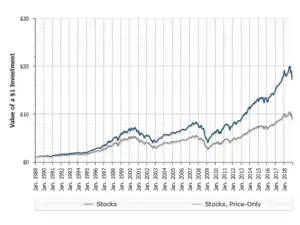Income Investing? Think Dividends
Income Investing? Think Dividends
It used to be, investors seeking steady income turned exclusively to bonds, whose regular interest payments provided a dependable income source, especially for retirees.
But times have changed. With many retirements today lasting 30 years or more, income investors need to make sure their savings keep pace with inflation and last a long time. This means investing in assets that provide current income, yet have the potential to grow in value and yield over time.
One widely used strategy is to include dividend-paying stocks in your portfolio. History provides compelling evidence of the long-term benefits of dividends and their reinvestment:
- Dividends are a sign of corporate financial health. Dividend payouts are often seen as a sign of a company’s financial health and management’s confidence in future cash flow. Dividends also communicate a positive message to investors who perceive a long-term dividend as a sign of corporate maturity and strength.
- Dividends are a key driver of total return. There are several factors that may contribute to the superior total return of dividend-paying stocks over the long term. One of them is dividend reinvestment. The longer the period during which dividends are reinvested, the greater the spread between price return and dividend reinvested total return.
- Dividend payers offer potentially stronger returns, lower volatility. Dividends may help to mitigate portfolio losses when stock prices decline, and over long time horizons, stocks with a history of increasing their dividend each year have also produced higher returns with less risk than non-dividend-paying stocks. For instance, for the 10 years ended June 30, 2019, the S&P 500 Dividend Aristocrats — those stocks within the S&P 500 that have increased their dividends each year for the past 25 years — produced average annualized returns of 16.3% vs. 14.7% for the S&P 500 overall, with less volatility (11.7% vs. 12.7%, respectively).1
- Dividends benefit from potentially favorable tax treatment. Most taxpayers are subject to a top federal tax rate of only 15% on qualified dividends, although certain high-income taxpayers may pay up to 23.8%. However, that is still lower than the current 37% top rate on ordinary income.
- Dividend-paying stocks may help diversify an income-generating portfolio. Income-oriented investors may want to diversify potential sources of income within their portfolios.
Stocks with above-average dividend yields may compare favorably with bonds and may act as a buffer should conditions turn negative within the bond market.
Dividends Can Boost Total Return2
If you are considering adding dividend-paying stocks to your investment mix, keep in mind that they generally carry higher risk than bonds. Stock investing involves the potential for loss of principal. Also, dividends can be increased, decreased, and/or eliminated at any time without prior notice. That’s why it’s important to choose your dividend-paying stocks carefully, since some companies may increase dividends to attract investors if their finances aren’t watertight or their outlook is cloudy.
Your financial professional can help you determine if dividend-paying stocks are a good fit for your portfolio.
1Source: DST Systems, Inc., based on data from Standard & Poor’s. Volatility is measured by standard deviation. Standard deviation is a historical measure of the variability of returns relative to the average annual return. If a portfolio has a high standard deviation, its returns have been volatile. A low standard deviation indicates returns have been less volatile. Past performance is no guarantee of future results.
2Source: ChartSource®, DST Systems, Inc. For the period from January 1, 1989, through December 31, 2018. Stocks are represented by the S&P 500 index. Stock prices are represented by the change in price of the S&P 500 index. It is not possible to invest directly in an index. Index performance does not reflect the effects of investing costs and taxes. Actual results would vary from benchmarks and would likely have been lower. Past performance is not a guarantee of future results. © 2019, DST Systems, Inc. Reproduction in whole or in part prohibited, except by permission. All rights reserved. Not responsible for any errors or omissions. (CS000080)
Because of the possibility of human or mechanical error by DST Systems, Inc. or its sources, neither DST Systems, Inc. nor its sources guarantees the accuracy, adequacy, completeness or availability of any information and is not responsible for any errors or omissions or for the results obtained from the use of such information. In no event shall DST Systems, Inc. be liable for any indirect, special or consequential damages in connection with subscriber’s or others’ use of the content.
© 2019 DST Systems, Inc. Reproduction in whole or in part prohibited, except by permission. All rights reserved. Not responsible for any errors or omissions. The opinions voiced in this material are for general information only and are not intended to provide specific advice or recommendations for any individual. All performance referenced is historical and is no guarantee of future results. All indices are unmanaged and may not be invested into directly. This article was prepared by DST Systems Inc. This information is not intended to be a substitute for specific individualized tax or legal advice. We suggest that you discuss your specific situation with a qualified tax or legal advisor. Please consult me if you have any questions. LPL Financial Representatives offer access to Trust Services through The Private Trust Company N.A., an affiliate of LPL Financial.














Leave a Reply
Want to join the discussion?Feel free to contribute!